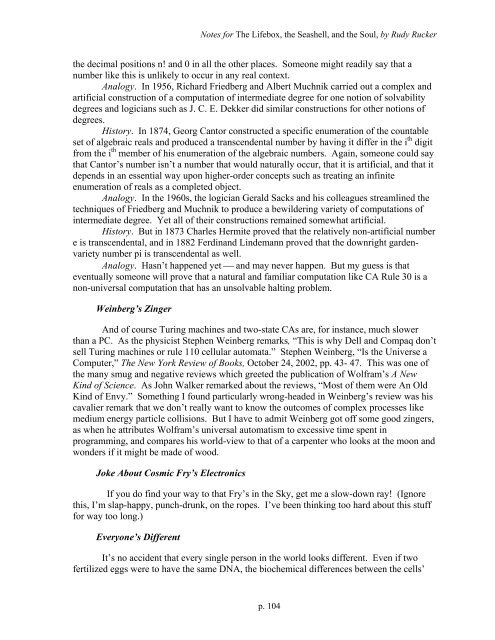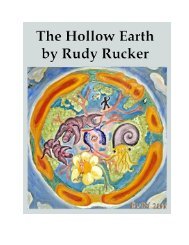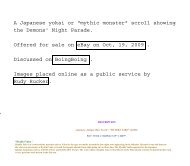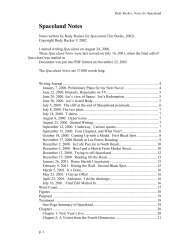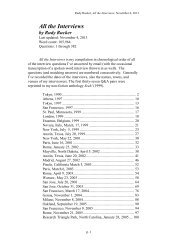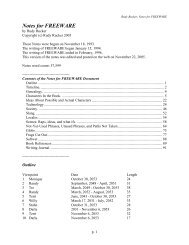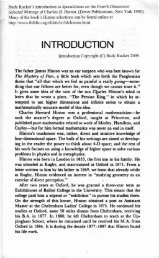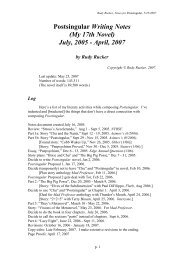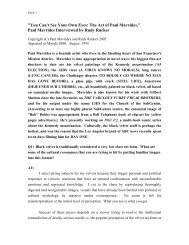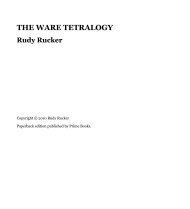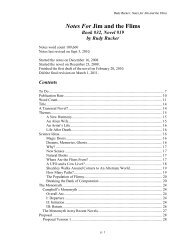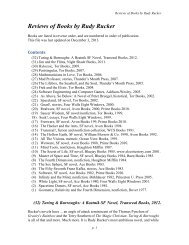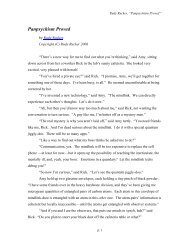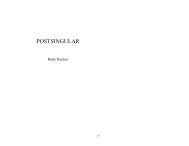Notes for the Lifebox, the Seashell, and the Soul - Rudy Rucker
Notes for the Lifebox, the Seashell, and the Soul - Rudy Rucker
Notes for the Lifebox, the Seashell, and the Soul - Rudy Rucker
Create successful ePaper yourself
Turn your PDF publications into a flip-book with our unique Google optimized e-Paper software.
<strong>Notes</strong> <strong>for</strong> The <strong>Lifebox</strong>, <strong>the</strong> <strong>Seashell</strong>, <strong>and</strong> <strong>the</strong> <strong>Soul</strong>, by <strong>Rudy</strong> <strong>Rucker</strong><br />
<strong>the</strong> decimal positions n! <strong>and</strong> 0 in all <strong>the</strong> o<strong>the</strong>r places. Someone might readily say that a<br />
number like this is unlikely to occur in any real context.<br />
Analogy. In 1956, Richard Friedberg <strong>and</strong> Albert Muchnik carried out a complex <strong>and</strong><br />
artificial construction of a computation of intermediate degree <strong>for</strong> one notion of solvability<br />
degrees <strong>and</strong> logicians such as J. C. E. Dekker did similar constructions <strong>for</strong> o<strong>the</strong>r notions of<br />
degrees.<br />
History. In 1874, Georg Cantor constructed a specific enumeration of <strong>the</strong> countable<br />
set of algebraic reals <strong>and</strong> produced a transcendental number by having it differ in <strong>the</strong> i th digit<br />
from <strong>the</strong> i th member of his enumeration of <strong>the</strong> algebraic numbers. Again, someone could say<br />
that Cantor’s number isn’t a number that would naturally occur, that it is artificial, <strong>and</strong> that it<br />
depends in an essential way upon higher-order concepts such as treating an infinite<br />
enumeration of reals as a completed object.<br />
Analogy. In <strong>the</strong> 1960s, <strong>the</strong> logician Gerald Sacks <strong>and</strong> his colleagues streamlined <strong>the</strong><br />
techniques of Friedberg <strong>and</strong> Muchnik to produce a bewildering variety of computations of<br />
intermediate degree. Yet all of <strong>the</strong>ir constructions remained somewhat artificial.<br />
History. But in 1873 Charles Hermite proved that <strong>the</strong> relatively non-artificial number<br />
e is transcendental, <strong>and</strong> in 1882 Ferdin<strong>and</strong> Lindemann proved that <strong>the</strong> downright gardenvariety<br />
number pi is transcendental as well.<br />
Analogy. Hasn’t happened yet ⎯ <strong>and</strong> may never happen. But my guess is that<br />
eventually someone will prove that a natural <strong>and</strong> familiar computation like CA Rule 30 is a<br />
non-universal computation that has an unsolvable halting problem.<br />
Weinberg’s Zinger<br />
And of course Turing machines <strong>and</strong> two-state CAs are, <strong>for</strong> instance, much slower<br />
than a PC. As <strong>the</strong> physicist Stephen Weinberg remarks, “This is why Dell <strong>and</strong> Compaq don’t<br />
sell Turing machines or rule 110 cellular automata.” Stephen Weinberg, “Is <strong>the</strong> Universe a<br />
Computer,” The New York Review of Books, October 24, 2002, pp. 43- 47. This was one of<br />
<strong>the</strong> many smug <strong>and</strong> negative reviews which greeted <strong>the</strong> publication of Wolfram’s A New<br />
Kind of Science. As John Walker remarked about <strong>the</strong> reviews, “Most of <strong>the</strong>m were An Old<br />
Kind of Envy.” Something I found particularly wrong-headed in Weinberg’s review was his<br />
cavalier remark that we don’t really want to know <strong>the</strong> outcomes of complex processes like<br />
medium energy particle collisions. But I have to admit Weinberg got off some good zingers,<br />
as when he attributes Wolfram’s universal automatism to excessive time spent in<br />
programming, <strong>and</strong> compares his world-view to that of a carpenter who looks at <strong>the</strong> moon <strong>and</strong><br />
wonders if it might be made of wood.<br />
Joke About Cosmic Fry’s Electronics<br />
If you do find your way to that Fry’s in <strong>the</strong> Sky, get me a slow-down ray! (Ignore<br />
this, I’m slap-happy, punch-drunk, on <strong>the</strong> ropes. I’ve been thinking too hard about this stuff<br />
<strong>for</strong> way too long.)<br />
Everyone’s Different<br />
It’s no accident that every single person in <strong>the</strong> world looks different. Even if two<br />
fertilized eggs were to have <strong>the</strong> same DNA, <strong>the</strong> biochemical differences between <strong>the</strong> cells’<br />
p. 104


